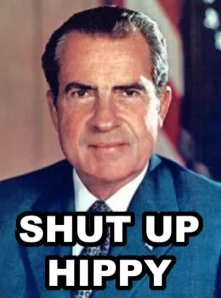Boy, don't we wish we had those back today.
Consider The Washington Post, May 30, 2007,
here:
According to Fed data, homeowners' equity -- the value of their homes minus mortgage debt -- grew to nearly $11 trillion at the end of [2006], or double the value at the end of 1998. ...
[T]he housing boom ... fueled spending directly by turning homes into cash machines. As prices rose and interest rates fell, Americans extracted trillions of dollars in extra cash through home sales, mortgage refinancings and home equity loans.
Homeowners gained an average of nearly $1 trillion a year in extra spending money from 2001 through 2005 -- more than triple the rate in the previous decade -- according to a study by former Federal Reserve chairman Alan Greenspan and Fed economist James E. Kennedy. That's the "free cash," as the authors call it, left over after closing costs and other fees deducted from equity withdrawals.
Most of the money extracted during those boom years, nearly two-thirds, came from home sales, the authors found. Another 21 percent came from home equity lines of credit, while 15 percent came from mortgage refinancings.
About a third of the free cash gained during this period was used to buy other homes, they calculated. About 29 percent was used to acquire stocks and other assets. About 12 percent went to home improvements. And nearly a fourth, 23 percent, went to consumer spending, including paying credit card bills and reducing other non-mortgage debts.
Translated into dollars, a trillion dollars a year for five years over 2001 through 2005 is $5 trillion nominal in extra spending money, nearly a quarter of which, $1.15 trillion, was simply blown. Some people literally ate it, drank it, and danced the night away with it. If the study is correct, the extra spending money in the 1990s from our homes came to an additional $3 trillion. I can only guess about the 1980s, but even if only $1.5 trillion, this means Americans have easily extracted almost $10 trillion from home equity over the course of 30 years.
A review of the latest Federal Reserve data
here shows that net worth of owners' equity in household real estate has fallen $7 trillion just since 2005. Falling from $13.2 trillion in 2005 to $6.2 trillion as of the end of Q2 2011, this is a decline of 53 percent. This metric pretty perfectly mirrors the bubble in housing which began in earnest in 1997, coincident with the change in the tax law permitting capital gains tax free every two years up to $500K with conditions. Except that the measure hasn't yet quite reached what it was in 1997. We're still about a trillion dollars shy of that mark in nominal terms.
Total real estate valuation over the same period has fallen less, from $22.1 trillion to $16.2 trillion, or 27 percent. But equity as a percentage of value has fallen more than valuation, 35 percent.
A longer term chart of the latter phenomenon found
here shows that since 1980 home equity as a percentage of value has been under constant pressure, most probably from what is called portfolio shifting, debt expenditures from car loans and credit cards, college tuition, stock investing and second, third and fourth home investing piling into HELOCs, 2nds, refis and the like. The interest on all that stuff before 1986 was tax deductible in its own right, but after Reagan's famous tax reform, deductibility was restricted to interest from home equity loans and lines of credit only. That arrangement was formalized at levels up to $100K in 1987, precisely after which as shown in the chart the decline in owners' equity commenced with new vigor. So people who could financed everything they could through HELOCs, cash out refinancing and the like in order to continue to be able to deduct the interest expense on their tax returns.
As a result of this and the collapse in the real estate bubble, today we are faced with the dramatic all time low of 38 percent in owners' equity as a percentage of value, a decline of nearly 47 percent since 1982.
Just think how much better off we would be today if we hadn't tapped all that equity over those three decades, especially in inflation-adjusted terms. We truly have been the squanderers.
So present household real estate valuation at $16.2 trillion represents a level last seen in 2003 in nominal terms. But adjusted for inflation, that's $13.7 trillion, which was actually the total nominal value of household real estate last seen in 2001. To get to the pre-bubble valuations of 1996, today's number would have to fall yet further to $11.8 trillion.
In other words, to erase completely the effects of the bubble on valuations, adjusted for inflation, would imply that total real estate valuation would need to fall another 27 percent from here, or $4.4 trillion.
The American
dream nightmare.



















